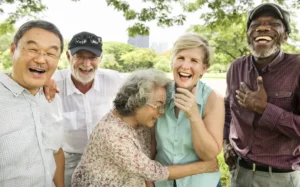Human beings are inherently social creatures. Spending time with and receiving validation from others is important to us, especially during life’s transitions, which is why support groups for older adults are so popular.
As we age, we can expect physical decline. Although our social networks may become more meaningful, they often become smaller. As we enter the middle and later stages of life, finding a support group that suits you can be helpful for your health, well-being, and quality of life.
Here are some ways attending support groups can benefit you:
– Socializing and fostering new friendships
– Strengthening your ability and confidence to age in place
– Becoming aware of community support
– Preparing for future situations
– Helping others going through similar experiences
Here are some tips to help you get started on your support group search:
1. Senior Centers
Visit or call your local senior center! These centers are hubs of information, resources, activities, and support. They often hold support groups, such as caregiver support, dementia support, or grief support groups.
There are also opportunities to get involved socially with interest groups or hobbies. Ask the staff or attendees about current support group offerings and check their calendar of events. If nothing resonates with you, inquire about other supports within the community. They may even be open to starting a new group, especially if you are willing to lead it.
2. Social Media
Social media is a great tool for social support, with middle-aged and older adults making up the largest percentage of Facebook users. Facebook groups (both private and public) are excellent for connecting with people who share similar experiences. Explore other social media platforms like Instagram, Twitter, or LinkedIn for more opportunities.
3. Meetup Groups
Meetup groups are perfect for forming connections based on shared interests or hobbies. While some groups may cater to all ages, there are often groups specifically for older adults or those addressing aging-related issues. Meetup groups are typically informal, which can be less intimidating if you prefer not to share extensively.
4. Local Library
Libraries offer more than just books—they are also great resources for support groups and information sessions. Many libraries host interactive classes, workshops, and even exercise classes like gentle yoga or stretching. Librarians may also be willing to develop new programs based on community interest.
5. Fitness Centers and Gyms
Inquire at your gym about classes for older adults or those with specific health conditions. Classes like yoga for arthritis or cancer survivorship can offer both physical activity and support. Besides your gym, look into other fitness centers or local universities, as they may offer reduced fees or senior-specific classes.
6. Long-Term Care Facilities
Support groups are common in assisted living facilities, nursing homes, and independent living communities. Many of these groups, such as those for grief, depression, or Alzheimer’s/dementia, are open to community members. Check out local facilities to see what they offer.
7. Lifelong Learning Programs
Lifelong learning programs, also known as adult education centers, bring people together based on mutual interests. These programs may include in-person classes, special interest group meetings, and group outings. Learning new skills or hobbies in retirement can also provide social support and connection.
8. Consult with Your Primary Care Physician
If you need support for a specific health-related matter, talk to your primary care physician (PCP). For surgery, chemo, or rehab, hospitals often offer support groups for conditions like breast or prostate cancer, or joint replacement.
9. Neighborhood and Community Groups
Neighborhood groups can vary by region, but options may include civic associations or naturally occurring retirement communities (NORCs). Online community groups can also offer support and resources.
10. The Alzheimer’s Association
The Alzheimer’s Association provides numerous resources, not just for Alzheimer’s/dementia. Local chapters offer various support groups and activities. Consider attending events like the Alzheimer’s Walk to connect with vendors and organizations. Explore their recommended books and movies on aging for additional inspiration.
Finding the Right Fit
It can be overwhelming to sift through all the options, but the above recommendations are a good starting point. It’s okay if you don’t know exactly what you’re looking for. Each support group is different, so pay attention to aspects you like or dislike. This will help you find the right fit for you.
Original Blog: https://www.joincake.com/blog/support-groups-for-older-adults/


Leave a Reply